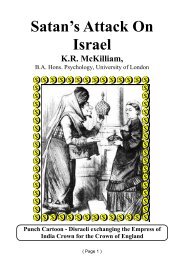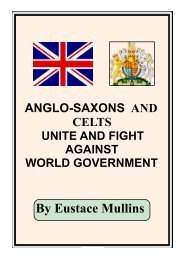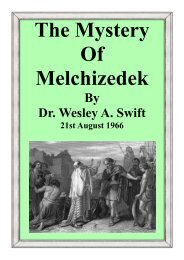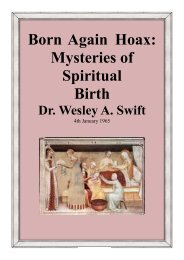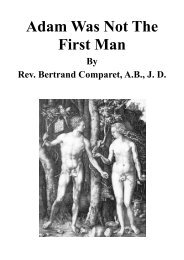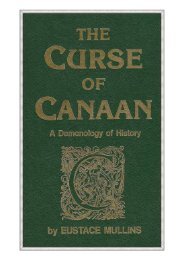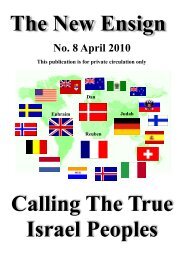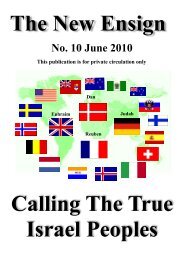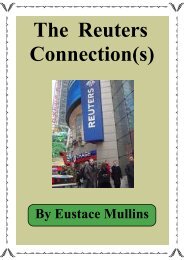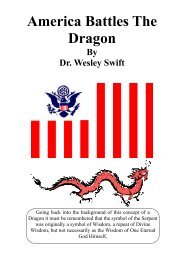The Extortion SYSTEM Of The Ruling Elite - The New Ensign
The Extortion SYSTEM Of The Ruling Elite - The New Ensign
The Extortion SYSTEM Of The Ruling Elite - The New Ensign
Create successful ePaper yourself
Turn your PDF publications into a flip-book with our unique Google optimized e-Paper software.
the <strong>SYSTEM</strong> to be free of the Laws that apply to the masses. <strong>The</strong>re are laws that the masses are<br />
not told about but are used in the background for those running the <strong>SYSTEM</strong>. One such system<br />
of laws is the Uniform Commercial Code, which the UNITED STATES operates under. Canada<br />
or rather the Crown in Right of Canada has signed onto the UNCITRAL Law system. <strong>The</strong>se can<br />
be viewed at:<br />
http://www.uncitral.org/uncitral/en/case law.html<br />
<strong>The</strong>re will be more information available on the UNCITRAL Law system later in the book. Now<br />
let’s move onto SOURCES OF CANADIAN LAW. Read through the following paragraphs,<br />
copied from the Canadian Government website, then I will discuss what they really say. Sources<br />
of Canadian Law as stated by the Canadian Government Link:<br />
http://canada.justice.gc.ca/en/dept/pub/just/CSJ page7.html<br />
Canada's present legal system derives from various European systems brought to this continent<br />
in the 17th and 18th centuries by explorers and colonists. Although the indigenous peoples whom<br />
the Europeans encountered here each had their own system of laws and social controls, over the<br />
years the laws of the encroaching immigrant cultures began to prevail. After the English defeat<br />
of the French at Quebec in 1759, the country fell almost exclusively under English law. Other<br />
than in Quebec, where the civil law was codified on the model of the French Code Napoléon,<br />
Canada's criminal and private law has its basis in English common and statutory law.<br />
<strong>The</strong> common law, which developed in Great Britain after the Norman Conquest, was based on<br />
the decisions of judges in the royal courts. It is called judge-made law because it is a system of<br />
rules based on "precedent". Whenever a judge makes a decision that is to be legally enforced,<br />
this decision becomes a precedent: a rule that will guide judges in making subsequent decisions<br />
in similar cases. <strong>The</strong> common law is unique in the world because it cannot be found in any "code"<br />
or "legislation"; it exists only in past decisions. However, this also makes it flexible and adaptable<br />
to changing circumstances.<br />
<strong>The</strong> tradition of civil law is quite different. It is based on Roman law, which was consolidated<br />
by the Roman Emperor Justinian. <strong>The</strong> law in ancient Rome was scattered about in many places:<br />
in books, in statutes, in proclamations. Justinian ordered his legal experts to put all the law into<br />
a single book to avoid confusion. Ever since, the civil law has been associated with a "civil code",<br />
containing almost all private law. Quebec's Civil Code was first enacted in 1866, just before<br />
Confederation (as the Civil Code of Lower Canada), and periodically amended over the years.<br />
<strong>The</strong> reformed Civil Code of Quebec came into effect in 1994. Like all civil codes, such as the<br />
Code Napoléon in France, it contains a comprehensive statement of rules, many of which are<br />
framed as broad, general principles so as to deal with any dispute that may arise. Unlike<br />
common-law courts, courts in a civil-law system first look to the Code, and then refer to previous<br />
decisions for consistency.<br />
When discussing the law as it pertains to Aboriginal people in Canada it is also necessary to<br />
consider Aboriginal rights and treaty rights which are protected under the Constitution.<br />
Aboriginal rights are those related to the historical occupancy and use of the land by Aboriginal<br />
peoples; treaty rights are those set out in treaties entered into between the Crown and a particular<br />
group of Aboriginal people.<br />
What we see here are dictatorship law systems. Roman Civil Law has but one principle within<br />
it: the Emperor’s will has force and effect. Thus any laws that may apply to a case can be<br />
circumvented by the Emperor’s will to do so. Napoleonic Code is based on the simple fact that<br />
you are guilty until proven innocent. If you are already judged as being guilty how can you be<br />
innocent British-Common Law, a Judge Made Law, is a sham because the Judge can make a<br />
new precedent at anytime, thus it doesn’t matter what any previous rulings are, it is simply what<br />
the Judge determines. <strong>The</strong>re is no rule of law here or rights or freedoms to consider.<br />
( Page 21 )




